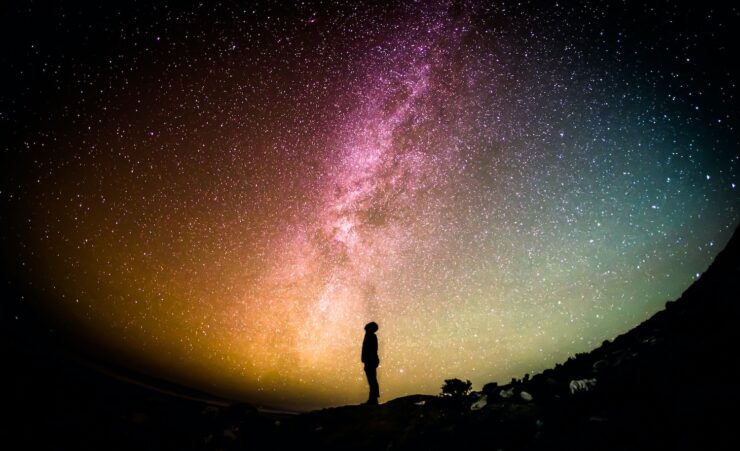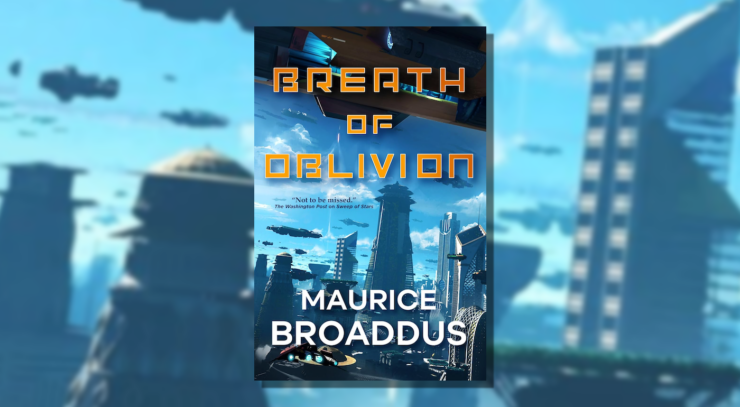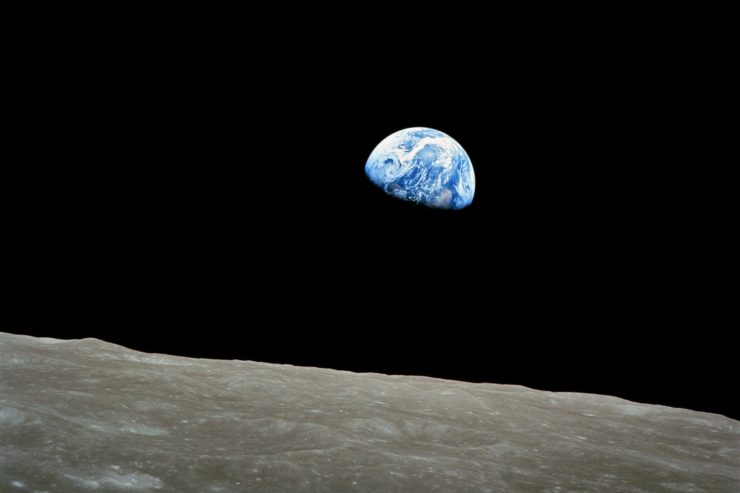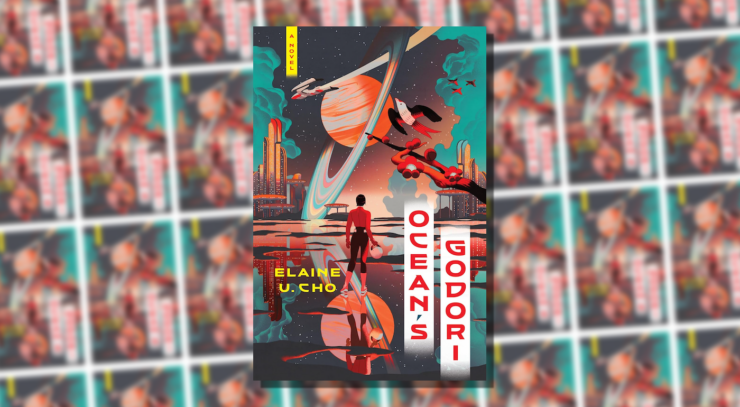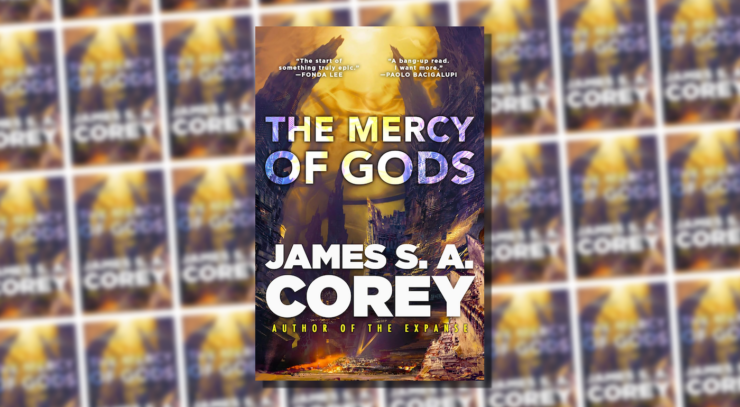We are living in a new golden age of space opera. People have proclaimed the death of this vital subgenre many times over the decades—but like a deep space probe upgraded by godlike aliens, space opera keeps coming back. (See my article in Esquire for more details!) I recently wrote a whole space opera trilogy, full of all my favorite space things.
I wouldn’t be writing space opera if I hadn’t read some incredible examples of the genre and had my brain exploded. So here are eleven books that radically expanded my understanding of what space opera is capable of.
Note: Your favorite book is probably not on this list. And that’s okay! Please make your own list of books that shaped your feelings about space opera and share those in the comments!
Note #2: Some of these books, I read years ago. I apologize in advance if my summaries contain inaccuracies or bloopers.
The Hitchhiker’s Guide to the Galaxy by Douglas Adams
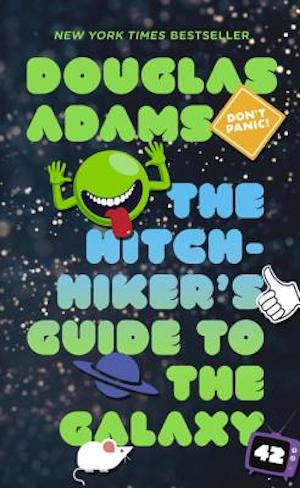
Yeah, me and everyone else. But this gloriously clever, subversive book really is essential reading. We’ve seen the story of Hitchhiker’s told in so many formats by now (including a Zork-y text adventure game) that it’s hard to remember how much anger and weirdness and wistfulness Adams packs into this novelization of his hit radio drama. Arthur Dent is the best example of a space opera mainstay: a human who is in no way larger than life, cast adrift in a huge, bewildering cosmos. But behind all the nightmare Vogon poetry and orbital whales is a profound awareness that the “meaning of life” is a fundamentally absurd notion and that panicking is our natural condition…but maybe it shouldn’t be? I think the foundational question of space opera is how tiny humans can find our way when space is REALLY BIG, and this book crystallizes it for me.
The Stainless Steel Rat by Harry Harrison
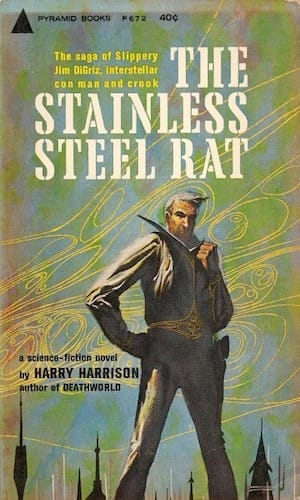
Okay, continuing the theme of ridiculousness…in high school, my friend John turned me on to these bonkers books, about an interstellar con man who falls in love with the super-assassin who keeps trying to kill him. And he runs for president of a planet! (Back then, the notion of a slimy con man getting elected president felt satirical.) Unlike Arthur Dent, “Slippery” Jim diGriz is hypercompetent and he definitely knows where his towel (and blaster) are. In a corrupt, rotten galaxy, an amoral con man can become kind of a good guy, using dirty tricks to clean up a planet. I often think about Harrison’s clever explanation of why an interstellar war would make no sense—essentially because given the costs of transporting goods between star systems, there’s nothing worth going to war for.
The Complete Hainish Novels and Stories by Ursula K. Le Guin
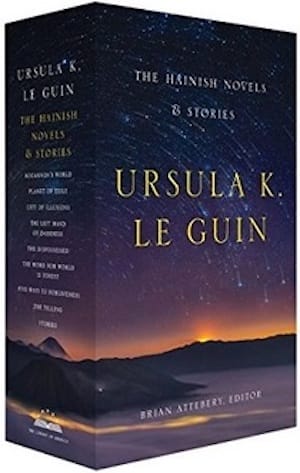
I’m cheating by including this ginormous doorstopper from the Library of America, comprising everything Le Guin wrote in her big space opera setting, including The Left Hand of Darkness and The Dispossessed, and a few other absolute classics. What I love about reading all of this stuff in one go is getting to see Le Guin building a whole universe. She absolutely does not care about canon or continuity, and contradicts herself from book to book. The paradigm-altering technology in her universe is not a weapon or a means of travel, but a communication device, the Ansible. Her benevolent galaxy-spanning organization, the Ekumen of All Worlds, sometimes finds ways to intervene when slavery and cultural genocide are being practiced. Her complex, flawed characters struggle, not with the vastness of space, but with the complexity of an individual culture on one world.
Dawn by Octavia E. Butler
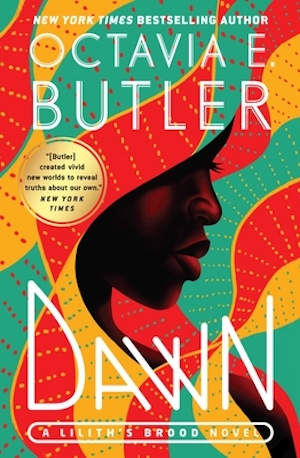
The first book of the Xenogenesis, or Lilith’s Brood, trilogy exploded my brain in the best possible way when I read it twenty years ago. Humans have finally made Earth uninhabitable, because of our accursed love of hierarchy, but some advanced aliens have saved some human beings, whom they want to interbreed with. Space opera frequently contains aliens who are either humans with minor differences, or god-blobs that cause psychedelic eye-barf. But the Oankali, Butler’s aliens, are genuinely unlike us and yet recognizably people, in a way that builds on what Le Guin was doing in books like The Left Hand of Darkness. The Oankali have a third gender, the Ooloi, and also an ingrained need to combine with other species. And they also provide a solid answer to the notion of the Great Filter (i.e., any species that becomes technologically advanced will wipe itself out) simply by being advanced without sharing all of our human nastiness. After reading this book, I could never think about “first contact” the same way again.
Consider Phlebas by Iain M. Banks
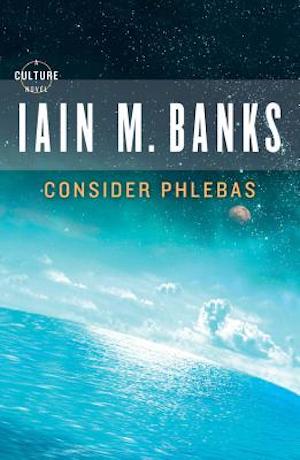
Back in the 1990s, someone recommended this book on a Blake’s 7 mailing list, as a fun ride that contains some of the same snarky, cynical flavor as the classic Blake’s 7. Relentlessly entertaining but also full of clever worldbuilding details, this book is a huge reason why I chose to devote my life to writing speculative fiction. I knew I could never write as well as Banks, but I was determined to try my best. Consider Phlebas was my introduction to the Culture novels, many of which I devoured in the ensuing years. It’s actually pretty atypical, in that the main character is an enemy of the Culture, and its highly advanced posthuman A.I.-driven worldview is heavily critiqued—but it filled me with curiosity and excitement to see more of these Minds and their quirkily-named starships.
House of Suns by Alastair Reynolds
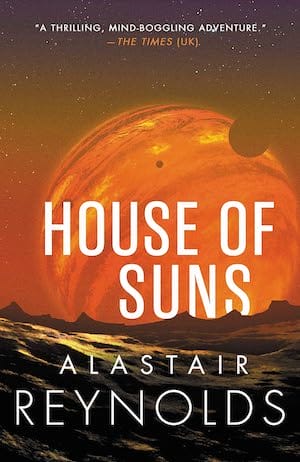
Banks arguably inspired a new wave of space opera centering artificial intelligences, posthuman heroes, and vast timescales as well as distances. (Props also to John Varley.) Alistair Reynolds, however, takes all of these ideas to new and different places, and this book was my introduction to his work. Full of characters who use cryogenic suspension and cloning to survive the long time periods involved in interstellar travel, this is a thrilling and dazzling story that plays with some of our fundamental notions of selfhood. And there’s a late reveal involving the requisite artificial intelligences that turns everything on its head splendidly. I reviewed it when it came out.
The Best of All Possible Worlds by Karen Lord
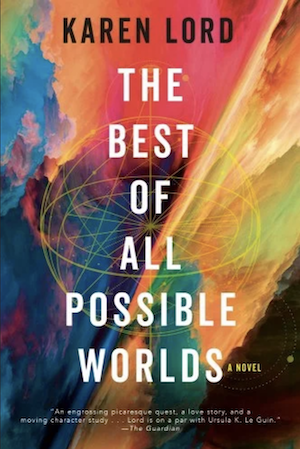
Lord excels in turning genre expectations upside down, and this book is a marvel. It starts with a horrific act of genocide, and then smoothly transitions into a sweet, thoughtful, often funny romance. The surviving members of the sadiri, a peaceful, rational people, are searching for mates to consider to continue their species. This leads them to a diasporic community, which has its own concerns. Basically, this feels like the sequel to 2009’s Star Trek that we never quite got, in which the survivors of Vulcan’s destruction search for a way to keep their culture and genes going in a harsh cosmos. But like I said, this book is surprisingly gentle and at times hilarious. Check out my full review from when it came out. Lord has released two other books set in this universe: The Galaxy Game, and the newly-released The Blue, Beautiful World.
The Long Way to a Small Angry Planet by Becky Chambers
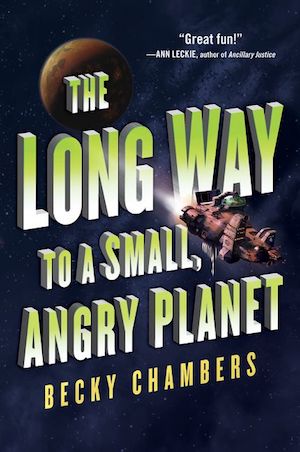
At a certain point, the kind of space opera that Banks and Reynolds were doing, where everyone’s a posthuman and A.I.s run everything, kind of gave way to what everyone calls “blue-collar space opera,” inspired by the movie Alien among other things. (See the Esquire article I linked above.) Part of what’s so great about Chambers’ debut is that it manages to do the “blue collar” thing without either A) lurching into “dark and gritty” territory or B) abandoning A.I.s altogether. In fact, TLWTASAP is mostly full of kindness and a playfulness, and the differences among human, non-human, and A.I. crewmembers are celebrated and explored in a gentle fashion. There’s a legit Star Trek-y ethical conundrum at the end of this book, which gets resolved in a somewhat “Tuvix” fashion, and you’ll be left endlessly debating whether the solution was right or wrong.
The Mimicking of Known Successes by Malka Older
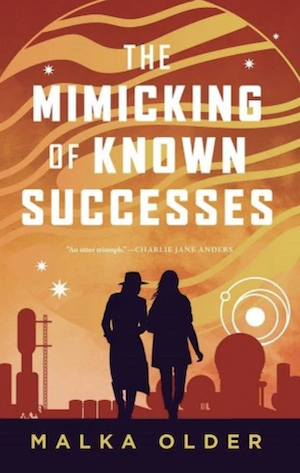
Now we’re getting into a few pretty recent books, all three of which are already among my favorite books of all time. First up, this delightful murder mystery which, to be fair, really only takes place on one planet: Jupiter, in a future where humans have screwed up both Mars and Earth. Similarly to The Best of All Possible Worlds, Mimicking takes a seemingly dark premise and goes in a surprising, charming direction with it. My elevator pitch for this book has been: “If Dorothy L. Sayers wrote Gaudy Night, but set it in orbit around Jupiter.” Mossa is a very Sherlock Holmes-esque investigator, with a dry wit and a somewhat dispassionate manner at times, and her latest case involves the university where her ex-girlfriend, Pleity, works. The two of them have to team up to solve what appears to be a murder, and soon their romance is no longer just in the past. It’s wonderful stuff.
The Red Scholar’s Wake by Aliette de Bodard
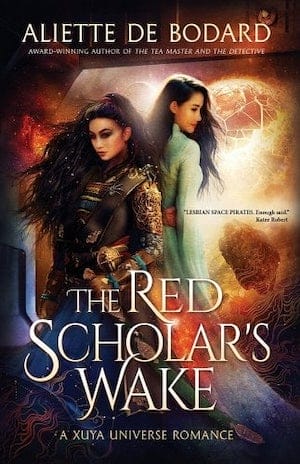
Speaking of romance… This book is swoon-worthy. I heard de Bodard read from it on a Zoom reading before it came out, and I was utterly hooked, to the point where I had to hunt down a copy from the UK because it wasn’t out stateside yet. Xích Si, a poor bot-maker, gets captured by space pirates, and expects to be executed or sold into slavery… but instead, the human avatar of the pirate ship, Rice Fish, comes to her and proposes marriage. Their wedding will be purely a matter of convenience, allowing Xích Si to do some work for Rice Fish without getting murdered by Rice Fish’s son or her other rivals. But of course, the thing that happens with pretend-marriages in fiction happens here. Oh, and did I mention that Xích Si hates pirates? There are sex scenes here involving bots that blew my mind, and there’s some truly excellent space combat too. This was my introduction to de Bodard’s Xuya universe, and I’m hooked. (Out nowish: the second Xuya romance, A Fire Born of Exile.) I reviewed The Red Scholar’s Wake here.
The Deep Sky by Yume Kitasei
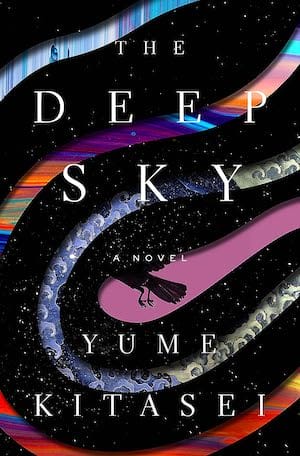
It’s rare to find one science fiction murder mystery where the “mystery” part is satisfying, let alone two—but this book is just as good as Mimicking. The Deep Sky takes place aboard the first ship ever to leave the solar system, where the crew consist entirely of cis women and non-binary people. (Every crewmember is supposed to get pregnant via artificial insemination halfway through the journey, for reasons I found slightly unconvincing. But I love this book so much otherwise, I didn’t care.) The protagonist, Asuka, is a Japanese-American girl who was chosen to represent Japan on the mission but struggles with feeling as though she’s not Japanese enough, along with general imposter syndrome. Asuka’s virtual-reality implant starts malfunctioning, which means every time she comes close to another person, she sees their VR environment instead of her own—which is a clever way of letting us learn about a lot of characters quickly, and also a comment on how boundaries get hard when you’re stuck in an enclosed space. Matters get more complicated when there’s a deadly explosion that also knocks the ship off course. And some of Asuka’s crewmates turn out to be members of eco-fascist and white supremacist groups, respectively. The Deep Sky takes a lot of the mainstays of the “colony ship” subgenre, including the tricky slingshot maneuver and the angst over leaving home forever, to new and fascinating places. (I reviewed it here.)
This article was originally published at Happy Dancing, Charlie Jane Anders’ newsletter, available on Buttondown.
Charlie Jane Anders is the author of the young-adult trilogy Victories Greater Than Death, Dreams Bigger Than Heartbreak, and Promises Stronger Than Darkness, along with the short story collection Even Greater Mistakes. She’s also the author of Never Say You Can’t Survive (August 2021), a book about how to use creative writing to get through hard times. Her other books include The City in the Middle of the Night and All the Birds in the Sky. She co-created Escapade, a trans superhero, for Marvel Comics, and featured her in New Mutants Vol. 4 and the miniseries New Mutants: Lethal Legion. She reviews science fiction and fantasy books for The Washington Post. Her TED Talk, “Go Ahead, Dream About the Future” got 700,000 views in its first week. With Annalee Newitz, she co-hosts the podcast Our Opinions Are Correct.










